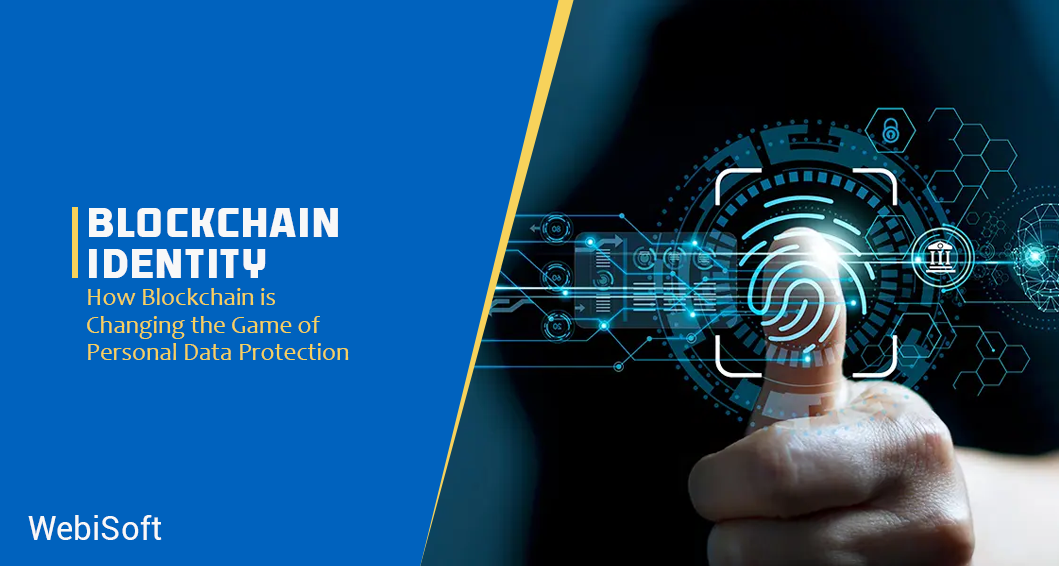In the digital age, identity theft, and data breaches are becoming increasingly prevalent. In fact, a Verizon partner leaked around 6 million account details in 2017 as a result of “an incorrect security setup in a server.”
So, there’s a pressing need for secure, reliable identity management solutions. Blockchain, a technology known for its robustness, transparency, and security, could hold the key to unlocking this challenge.
That’s why, we’re here to elaborately talk on blockchain identity. We’ll look at how blockchains are transforming identity verification, from creating self-sovereign identities to empowering users.
Contents
- 1 Regaining Data Control with Blockchain Identity Management
- 2 What are the Drawbacks of the Current Identity Management System?
- 3 How Does the Blockchain Identity System Function?
- 4 What is the Level of Trust? How does It Function?
- 5 What Advantages Does the Blockchain-Based Identity Management System Provide Users?
- 6 What are the Dangers of Blockchain-Based Digital Identity?
- 7 What Effect Will Blockchain Identity Management Have on Businesses and Users?
- 8 What Use Cases of the Blockchain Identification System Are There?
- 9 Final Words
Regaining Data Control with Blockchain Identity Management
There’s no denying that blockchain has taken several industries by storm, enhancing transparency, security, and adding value to businesses. Now, it’s ready to shake up identity management in a way that’s safe and sound.
You know how it goes – no matter where you turn, you’re always being asked to prove who you are, flashing your Voter ID, Passport, Pan Card, and whatnot.
The thing is, every time you share your IDs or digital credentials you’re opening up the possibility for privacy issues and data breaches. That’s where blockchain steps in, offering a route to self-controlled identity via decentralized networks, giving you:
- Privacy
- Trust
- Secure identity documents
- Verified identity documents
- Identity document endorsement by authorized parties
Think about all the times you use your identity documents and how often they’re shared with third parties, often without your clear approval, and then stored in some mysterious location.
It’s a part of life – applying for a loan, opening a bank account, getting a new sim card, booking a ticket, all need proof of who you are.
The weakest link in our current identity management system? That’s got to be government institutes, banks, and credit agencies as they’re prone to data theft and hacking.
So, blockchain might just be the hero we need, cutting out the middlemen and letting us manage our own identities. But before we leap into the blockchain, it’s crucial to understand how identity management works now and what hurdles we’re facing.
What are the Drawbacks of the Current Identity Management System?
Let’s talk about the current identity system for management confronting four significant challenges —
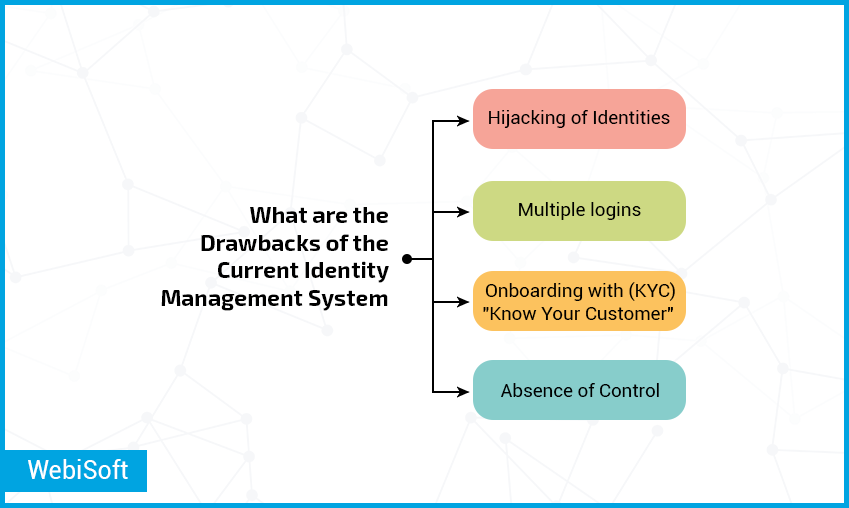
Hijacking of Identities
The digital world is a risky place, my friend. Imagine, you share your details over the internet with various websites and services, and whoops! The wrong set of eyes gets hold of it.
Centralized servers used by online applications store this data and, let’s be honest, they’re a hacker’s dream! Now get this, the Breach Level Index shows that each day, 4,861,553 records are snatched away – that’s:
- 2,96914 records hourly
- 4,949 records per minute
- 82 records every single second
Chilling, isn’t it?
Multiple logins
You know the drill. Sign up here, sign up there. Each time, you’re coming up with another unique username-password combo.
It’s quite the mental workout remembering all those! And managing distinct authentication profiles is no piece of cake either.
Onboarding with “Know Your Customer” (KYC)
Here’s a little peek behind the curtain – the current process involves three key players:
- KYC companies (verifiers)
- Users (that’s you!)
- And third parties needing to verify user identities
It’s not cheap for any of these guys. With banks, healthcare providers, immigration officials, and more knocking at their door, KYC companies need to up their game.
More resources mean higher verification costs, and guess who foots the bill? You, via those sneaky hidden fees. Plus, the waiting game for third-party companies to onboard customers is longer than you’d like.
Absence of Control
Here’s the kicker – as users, we’re in the dark about our Personally Identifiable Information (PII). We’ve no clue:
- How often our PII is being shared without our say-so
- Where all our personal information is tucked away
Hence, it’s high time we gave the existing identity management process a digital facelift. Enter blockchain.
With blockchain:
- We could build a platform safeguarding our identities from breaches and thefts
- We could bid adieu to the username-password tango
- We could establish encrypted digital identities, fully under our control
So let’s see how a blockchain identity management system could be our knight in shining armor!
How Does the Blockchain Identity System Function?
Well, let’s break down the technical nitty-gritty. We’re talking about five tech components and interfaces that play a part in Blockchain-based Identity Management:
- Apps for users like you and me, tailored for Android/iOS.
- Separate apps for verifying third-party companies are also designed for Android/iOS.
- An Interplanetary File System to house your Personally Identifiable Information (PII).
- Microservices whipped up using Node.JS.
- And, a Permissioned Blockchain Component.
Remember that behind those complicated-sounding terms like ‘Interplanetary File System’ and ‘Node.JS Microservices’, there’s a team like Webisoft, making it all come together. We’re not just a company; we’re pioneers in the field of blockchain. We offer top-tier blockchain customized applications.
So, How Does This All Fit Together?
Right now, we need a digital alternative to manage our identities rather than old-school paper documents. That’s where a Blockchain Identity Management app comes in. This app verifies and validates our identity in real time.
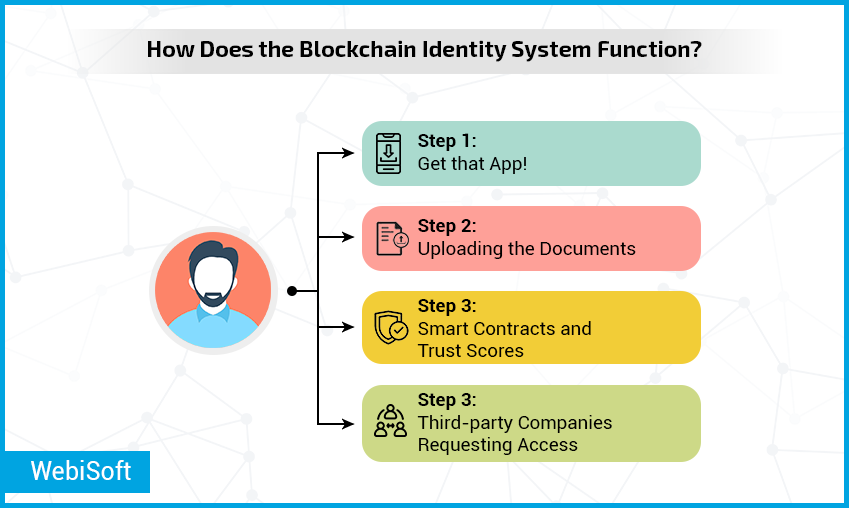
Step 1: Get that App!
To start, you’ve got to snag the app from the play store or app store. After you’ve got it on your phone, you’ll set up a profile. And voila, you’re handed a unique ID number. This number is the golden key for organizations to access your identification documents.
Step 2: Uploading the Documents
Once you’ve got your ID number, it’s time to upload your government-approved IDs onto the app. These will be stored securely in the IPFS, with the hashed addresses tucked away in the blockchain.
The app will take your info from these IDs to certify your details. Best part? You own your data. You get to call the shots on what info is shared with which organizations. Nothing gets shared without your green light.
Step 3: Smart Contracts and Trust Scores
Imagine a score that showcases your trustworthiness. That’s what the Smart contracts do. They contain the business logic to create a trust score from the info you’ve given while crafting your self-sovereign identity.
Step 4: Third-party Companies Requesting Access
Picture this. A company needs to access certain details about you for authentication. So, they’ll ping you with a notification.
Once you give the nod, they’re able to use user information for authentication. Plus, you get to see exactly why your Personally Identifiable Information (PII) is being used.
Keep in mind, Blockchain isn’t a storage locker for your info. It just keeps a log of the interactions between identity holders and companies.
Let’s say, an immigration office verifies your identity via the app. That interaction is recorded on the blockchain for all connected nodes to see.
Let’s take a deeper dive with an example.
Picture our friend Alex. He’s looking to apply for study abroad programs, so he needs to prove who he is. The educational center can speedily verify his identity thanks to the decentralized identity management app.
Alex hands over his unique ID number to the center, allowing them to ask for permission to access his info. After he gives them the thumbs up, they can peek at his documents. This whole exchange is recorded on the blockchain.
Remember: All this PII is stored on your phone, encrypted, and backed up by the Inter-Planetary File System (IPFS).
Now, we mentioned that smart contracts could set off the business rules and generate a trust score for every individual using blockchain identity management. But what does that really mean? How does the trust score work?
Well, let’s get into how a trust score can aid an organization in verifying a user’s authenticity.
What is the Level of Trust? How does It Function?
Simply put, the higher the trust score, the more trustworthy the individual. Trust scores, brought to life by smart contracts, assist organizations in verifying users’ identities in a snap.
Now, how do you pump up your trust score? By uploading multiple documents onto the app.
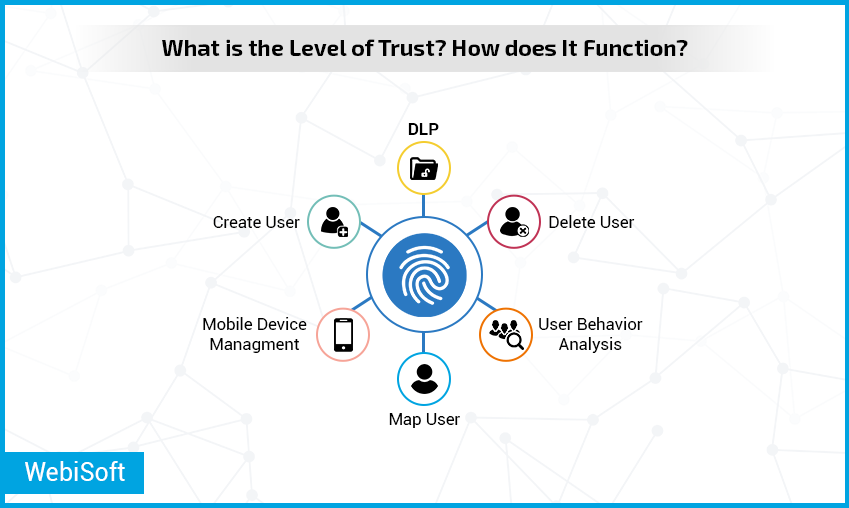
The trust score becomes a sort of litmus test, indicating whether an account seems fishy or legit. And to keep that score shining bright, you’ve got to use your identity regularly.
New to the system? You’ve got a six-month window post-signup to build up your trust score, giving you ample time to upload all the necessary info.
Take, for example, the Bank of America. If they need to verify someone’s authenticity before approving a loan, they can quickly check out the trust score. It’s a window into how trustworthy the person is, saving both time and money.
Here are three trust score builders:
- Document Uploads More documents you upload, the higher your trust score. This is especially crucial for those new on the scene to start racking up their scores.
- Matching Info The system checks whether details like your name, birth date, and so on, match across all uploaded documents. The more matches, the better the score.
- Regular Use Regular use keeps your trust score healthy and steady.
And here are three things that can dent your trust score:
- Not uploading relevant documents? Your trust score takes a hit.
- If you don’t grant access to specific organizations to verify your identity, your trust score can dip.
- Frequently changing your personal information? It might make you look suspect, and your trust score might drop.
What Advantages Does the Blockchain-Based Identity Management System Provide Users?
There are four advantages to utilizing blockchain ID management from the user’s perspective:
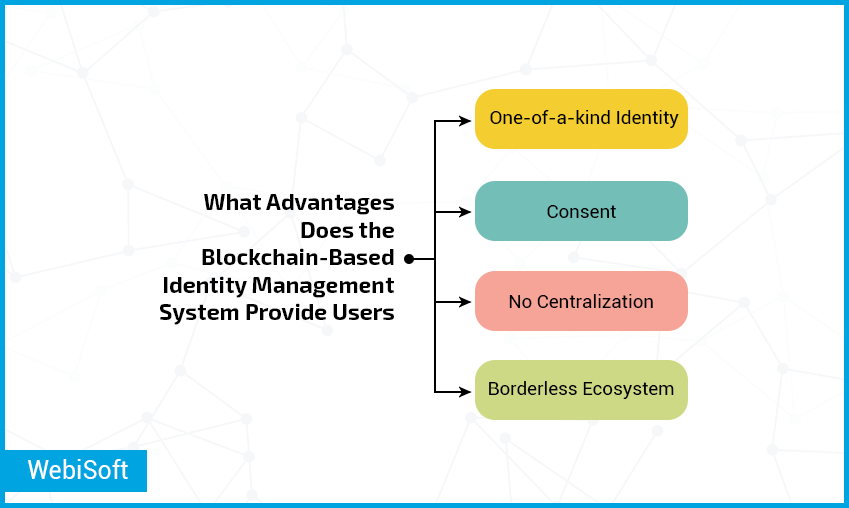
One-of-a-kind Identity
Upon signing up, you’ll receive a unique ID number. This ID, chock full of your personal details encrypted and safely stashed away on your device, can be shared with anyone to verify your identity, all thanks to blockchain technology.
Consent
Blockchain doesn’t hoard any of your info. Plus, with smart contracts at play, your data can’t be tampered with. Any information sharing requires your explicit say-so, putting you firmly in control of your personal data. In short, it’s your info, your rules.
No Centralization
Forget about storing your identifying docs on some central server. They’re secure on your device, keeping them far from the clutches of mass data breaches. No hacker can weasel out your info from this decentralized system.
Plus, there’s no single weak link (a single point of failure or SPOF) that, if broken, could bring the entire system crashing down. That means your data stays uncompromised, always.
Borderless ecosystem
Blockchain doesn’t care about geographical lines. You can authenticate your identity anywhere, anytime.
What are the Dangers of Blockchain-Based Digital Identity?
So, we’ve talked a lot about the perks of decentralized identities powered by blockchain, but it’s only fair we chat about some of the risks too, right? Let’s dive in:
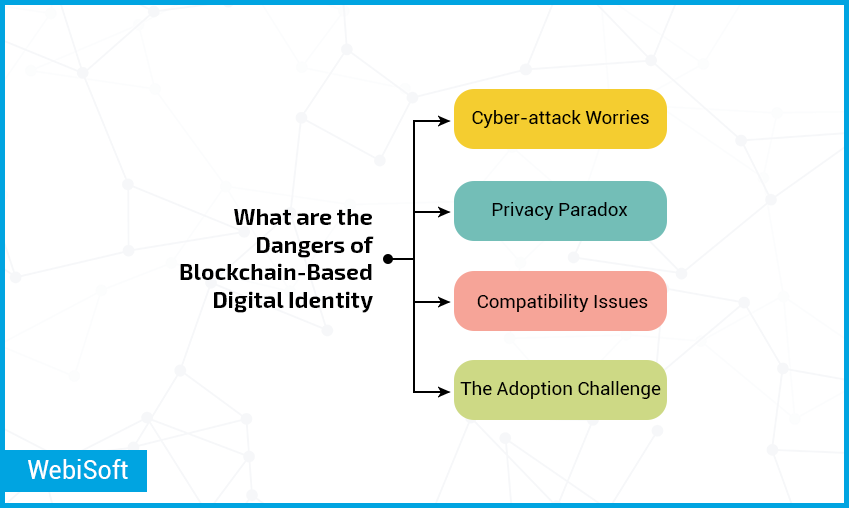
Cyber-attack Worries
There’s a chance digital identities backed by blockchain could be exposed to online attacks. This is particularly true if the blockchain itself isn’t secure or if the cryptographic methods used aren’t up to scratch.
Privacy Paradox
While these identity blockchains could potentially offer users a greater say in their own personal data, they could also pose new threats to privacy.
For instance, personal details could be open for anyone to see if they’re stored on a public blockchain.
Compatibility Issues
It can be tricky to get different blockchain-based digital identity systems to work together, thanks to differences in tech, standards, and regulations.
The Adoption Challenge
For these blockchain-based digital identities to do their job effectively, they need to be widely accepted. But getting people to adopt them can be tough, particularly if people aren’t familiar with blockchain tech or if they’re resistant to change.”
What Effect Will Blockchain Identity Management Have on Businesses and Users?
Now, let’s consider the bigger picture. How does this blockchain identity management impact you and your businesses?
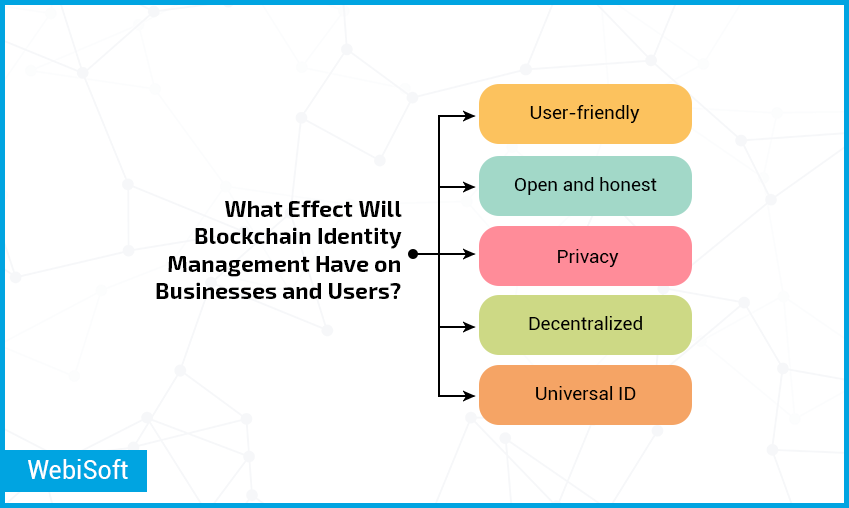
User-friendly
The blockchain universe is a penny-pincher’s paradise. It’s time-effective and cuts down the costs of identity verification for both businesses and users.
Open and honest
Everyone in the network can track the transactions recorded on the blockchain. Each transaction carries a verifiable seal of authenticity.
Privacy
Your transactions and identity stay private and secured from prying eyes.
Decentralized
Data isn’t lumped together on one central server. It’s scattered across each node in the network, doing away with any weak links.
Universal ID
Verify your identity with any organization, no matter where you (or they) are in the world.
What Use Cases of the Blockchain Identification System Are There?
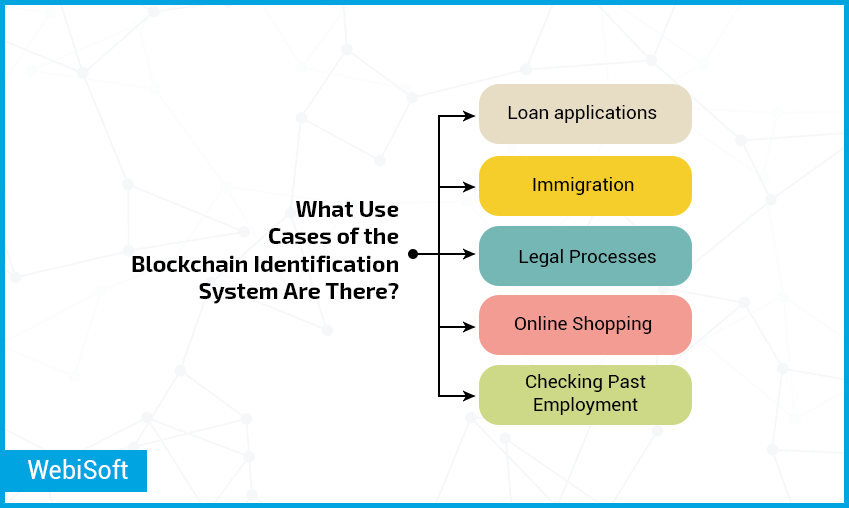
Here are five ways it can shake up the way we do things:
Loan applications
Picture this: You’re trying to apply for a loan or open a bank account. Usually, you’d be buried in paperwork, providing multiple forms of ID and then waiting around while they manually check everything out.
That could take ages! But with blockchain, you share the necessary info in a snap. Plus, you’ve only got one ID to worry about, saving you time, money, and a whole lot of hassle.
Immigration
Think about all the stuff you have to lug around when you’re traveling: your passport and a whole heap of other documents for airport checks. But with a universal, blockchain-based ID, you’ve got one less thing to worry about.
From booking your ticket, getting through security, and even settling down in a new country, you only need one ID for the whole journey. It’s smoother sailing for you and the authorities.
Legal Processes
Whether it’s showing
- your age
- proving your job
- providing your address
legal procedures usually mean carting around a bunch of different proofs of identity. But not with blockchain. You have one ID that legal and government bodies can check, so no more rifling through documents. And that means no more lengthy background checks.
Online Shopping
Ever got tired of filling in your details every time you order something online? Name, email, address – it can feel like you’re stuck on repeat.
But with a unique blockchain ID, you can breeze through signups on different e-commerce sites, saving you time and reducing the number of times you have to type out your address.
Checking Past Employment
Checking an employee’s background can be a maze of resumes, reference letters, and other documents, without a clear path to follow.
But thanks to blockchain, you can verify an employee’s resume straight from the source, as long as the user gives permission.
There you have it – just five ways this blockchain identity system can change things up!
Final Words
Blockchain identity management is poised to revolutionize the way we authenticate identities in our increasingly digital world. It eliminates intermediaries, bolsters security, and puts control back into the hands of users.
So, blockchain paves the way for a trust-based, decentralized authentication system. As we’ve explored, the impact of this technology goes beyond privacy and security, promising a more inclusive, efficient, and transparent global identity system.
Webisoft, a leading developer of custom Blockchain, DeFi, and dApps, is here to help. With our cross-platform application development expertise, we’ll help you leverage the advantages of these revolutionary technologies.
Don’t wait to innovate. Join Webisoft now and lead the digital transformation!
